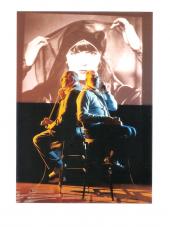'Cosmopolis': a claustrophobic stretch-limo ride into the future
"Prophetic," when applied to novels and films, is no longer just an adjective. It's a whole genre. There's no better, or worse, example of that than David Cronenberg's movie version of the Don DeLillo book "Cosmopolis" -- a futuristic thriller with plenty to ponder, but precious few thrills.
Our anti-hero is 28-year-old billionaire Eric Parker (Robert Pattinson), the greatest assets manager of the new millennium. We meet him as he's traveling across Manhattan in his spaceship-size stretch limousine -- in search of a haircut. It seems a modest enough goal but harder than it looks. He, and we, will be largely confined to that limo for an odyssey through the future-imperfect tense obsessions with power, money, sex, info-tech violence, revolution, death and redemption.
Is that all? It would be a lot to pack into the Encyclopedia Britannica, let alone a 107-minute movie.
But give auteur director Cronenberg credit for trying, if not succeeding, in rendering a Craven New World at the congested intersection of technology and capital. The new unit of currency is the rat. ("The rat closed lower today against the euro ... amid growing concern that the Russian rat will be devalued ...").
Time, as well as money, has become a corporate commodity, and Eric is having an "eXistenZ"-ial identity crisis. As a kind of teenage mutant hybrid of Gates, Zuckerberg and Jimmy Carter, money (in cyber-capital form) has "lost its narrative power" for him. He's ready to quit and find some new Habitat for Inhumanity.
But there's one last big currency deal on his agenda: wagering his entire vast fortune against the Chinese yuan. He does this -- as well as eating, sleeping and fornicating -- inside his armored, hermetically sealed limo. He even gets his cardiograms and proctological examinations there while the situation grows more and more unstable outside: Anarchists are attacking, throwing dead rats at the limo and covering it with anti-globalist graffiti.
It's a claustrophobic mise-en-scene, to say the least. The first change of scenery doesn't occur till about half an hour into the film, when Eric enters a bookstore inhabited by the blonde of his dreams (Sarah Gadon) and asks her, "When are we going to have sex?" Sex is his antidote to disillusion but not her preferred come-on line.
Mr. Pattinson, as an actor, has an understandable desire to escape the vampirical world of the undead and take on something more real, or at least different. But in the obtuse cosmology of "Cosmopolis," his persona goes from bloodthirsty to bloodless. As Eric, he tries his hand at a complex character with a brilliant mind and lust for control, but his monotone (and the constricted space) defeats him. His indication of deep disturbance consists of rubbing his face. Neither sex nor the approach of apocalypse now-and-then! gets much of a rise out of him -- or out of his women. It's not entirely his fault. By the time he finds a voice-activated gun and finally gets to that barbershop and a confessor (played by Paul Giamatti), it's too late to rescue his performance.
Give me your tired or energized, your rich or poor, your muddled stories, yearning to be free. But this one comes off more as a didactic philosophy lecture than a movie, with no momentum from scene to scene. DeLillo's novel is funny as well as horrific: Eric is worried about his asymmetrical prostate, for example. (Aren't we all?)
Comedy, alas, is not Cronenberg's strong suit. I'm a huge fan of the director's "Crash" (1996), "eXistenZ" (1999), "A History of Violence" (2005), "Eastern Promises" (2007) and of his underrated Sigmund Freud biopic, "A Dangerous Method," of last year. He is a terrific filmmaker, and the film at hand has fascinating moments and powerful images. But here, he's too faithful to Mr. DeLillo's overabundance of cryptic aphorisms ("Talent is more erotic when it's wasted" ... "Life is too contemporary").
The structural metaphor of life condensed into a single Long-Day's Limo Journey into Dystopian Night ends up drowning in a ponderous plethora of Ayn Rand, anti-Ayn Rand or Rand Paul ideas -- yak yak yak.
Cronenberg said he read "Cosmopolis," the novel, in 48 hours and wrote the screenplay in just six days. Haste makes waste. He, like Eric, should've listened to his prostate.






